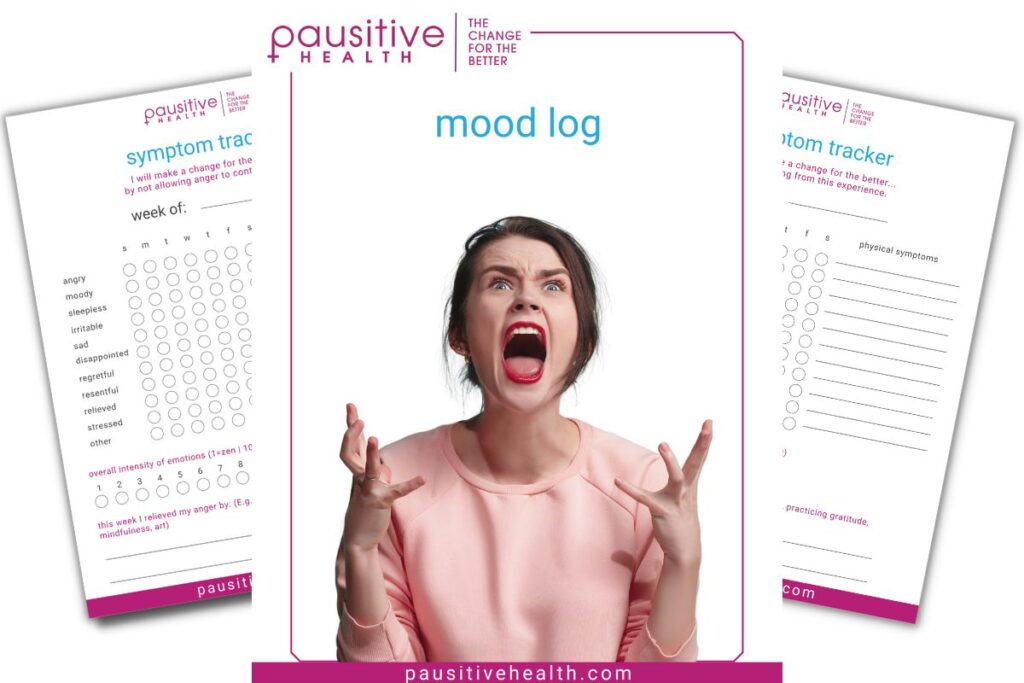While love can be the source of great joy and powerful connection, the opposite can also be true. It can be a source of anger, especially during the menopause journey. If you feel that a significant other/partner/spouse or friends and family don’t understand your menopause symptoms, irritability and frustration can grow to anger or even rage. The source of it all is the person/people you love most. Learn how to manage your anger and feel love again.
Anger and love
Love is a powerful emotion. Some would even say it is the most powerful emotion of all. But the vulnerability that is inherent in feeling and expressing love means there is the likelihood that at some point there will be at least moments of pain or disappointment and, for some, even the potential for a sense of betrayal.
It is often the case those you love the most and who love you most, paradoxically, have the unique ability to hurt you/them the most because of the very depth of that love. The actions and words of your parents, siblings, children, significant other/partner/spouse can cut you to the quick and sometimes drive a deep wedge even without that intention.
Behaviors that would not bother you or only cause simple irritation when displayed by others can drive us mad and make us see red when we have them directed at us by those we love. Our expectations and standards are set higher, and when they are not met, we do not respond well, even if they are too much to ask of another person in a given circumstance.
You feel anger toward this person because of your deep feelings for that person.
How often do you expect:
- someone you love to do what you want them to do?
- someone you love to see things the same way you do, i.e., what seems obvious, logical, and reasonable to you?
- someone you love to be telepathic about what you are thinking and feeling and things that would make your life easier and less stressful?
When those expectations are not met on your desired timeline or not at all, how often do you feel disappointed, frustrated, and resentful and then begin to simmer (even boil) in your juices, i.e., become angry in the midst of love?
Life is often not fair, and people are not perfect. Though everyone has the potential to change, sustainable movement in a different direction happens only when the individual wants to evolve.
External forces and requests (even pleas) may contribute to a decision to change, but true awareness, internalization, and habit only kick in when the individual is ready.
When you love unconditionally, you let love drive your actions, not anger.
Why you’re angry during menopause
Anger may be more magnified during your menopause journey because you’re also managing symptoms that result from changes and volatility in hormone balance. You may have extreme mood swings from irritability to rage, and everything in between.
Some menopause symptoms can directly contribute to a lowering of your anger threshold and can be overwhelming, depending on your journey. Others may also create a negative dynamic even in a good relationship, e.g., loss of interest in sex.
"Anger is the result of love. It is energy for defense of something you love when it is threatened."
Tim Keller
If you are in a relationship that is already frayed or could benefit from more time, attention, and patience, menopause may be a tipping point that makes it even more important to talk, express feelings, and determine if both parties are fully invested in doing the work required in every relationship to keep it going and thriving.
Creating a safe space for each person to tell the other how they are being impacted by menopause symptoms is critical to avoid misinterpretation and to get support that can make all the difference. Your lack of interest in sex-related solely to hormonal changes may be translated by the other person as a rejection of them and taken, incorrectly, as a sign that you don’t find them attractive anymore. There are very few people who are sexually confident enough to not have that thought at least cross their mind!
Explore your own feelings and clarify what you want. Then do the work that will increase your chances of getting it.

Why do I feel angry toward my spouse/partner?
Think about your relationships. Do you play the blame game? If you do, relationship specialist and author Eve Escher Hogan says that’s your ego protecting you.
While there are usually two sides to every story, the only side you control is yours. Think about the role you may play in the situation and the actions within your power to make things better. That may be changing some of your behaviors, being consciously present, or being vulnerable and expressing your feelings about how you are feeling about yourself and the changes that are happening with your body.
Answering that question isn’t easy. Hogan points out that responsibility can be hidden under feelings of anger, hurt, and fear.
Use an anger log to identify the triggers. They are often more than just love-related.
Uncertainty or fear may drive it too. Are you afraid of losing the one you love or even the person you thought you were?
Understand love is a two-way street, so you may not be the only one feeling anger. Ask your partner if they’re angry too.
Menopause can be difficult on a spouse or partner.
Studies show women+ often have insufficient knowledge and information regarding the menopause journey. Because many think of the menopause transition as something that starts in their 50s, it is not uncommon for women+ to not recognize or consider the possibility new or worsening health issues are related to the menopause journey, particulary during the perimenopause stage leading up to menopause.
Additionally, many physicians have not had sufficient training during medical school, residency, and fellowship to bring the necessary expertise to the table or to feel comfortable managing menopause, which requires thoroughly covering what it entails and the options available to address symptoms.
So, you can imagine how little others will know about the whole situation! They may also need a guide to menopause – what it is, its symptoms, how it affects you, and actions they can take to be supportive. And this may be the case even more if your partner or spouse is a man.
Given this overall state of affairs, it’s understandable if you are looking for ways to handle menopausal anger toward your husband or male partner.
Things may be easier with lesbian couples because each person will go through the journey at some point. However, they may also be more complicated if they are both on the journey at the same time and each is having moderate to severe symptoms. Misery may like company, but at the end of the day, you still have two miserable people who may not get the help they need and deserve.
Once you begin digging deep, reflecting, recognizing, and tracking your anger, you may be surprised at the causes.

Get Relief From Your Emotions
Having mood swings? Track how you feel, identify your triggers, and find ways to calm the emotional firestorm with this mood log.
"*" indicates required fields
Once you know the likely causes of your anger, begin moving the emotional boulders. Once you face the situation head-on, you’ll be in a better position to address the causes and take action, including having frank conversations with those you love.

6 ways to spark love in your relationship
Here are 6 ways to kickstart the exploration:
- Be self-aware and acknowledge your feelings.
- Ask yourself – what’s the meaning of love to me, and what do I want and need?
- Think of anger as a sign that can be a positive force that motivates you to take action.
- If needed, find forgiveness for yourself and the other person, and begin to release your pain. Holding on to it really won’t make things better.
- Focus on the present.
- Try to find hope for the future. You’ve been in difficult situations and come through the other side. You’ve already proven you can survive!
What’s the meaning of love in your life?
What does love mean to you? Ask yourself and ask your partner the same question. The answers may be different.
Steven Stosny, PhD, asks couples he’s working with if love is more like a da Vinci painting or an old worn sock. What do you think of love?
Let’s face it, by your 40s, 50s, and 60s, love may be more like a worn sock more of the time.
If you’ve been together for several years, the spark that united you may be missing, or life has made you both tired enough that it is easier not to put in the effort and go on auto-pilot.
Love is complicated. It’s friendship, companionship, and, in a partnered relationship, usually physical intimacy.
One or more of these components may be missing or diminished during menopause.
Deserving love
Once you know how you both think about love, Stosny asks clients if they feel deserving of love and, if so, how much.
Finally, he asks for a rating of the love they give in their relationship.
Stosny found in his work that in heterosexual relationships men felt they were worthy of love, but found it difficult to express their love to others in ways both large and small, or in ways the other person will recognize as a sign of their deep feelings.
There is sometimes an imbalance in relationships with regard to how much conscious and concrete effort is invested to provide the nurturing all relationships need to bring satisfaction and contentment to each person.
When you view someone as an old sock and take them for granted, inevitably, they will pick up on the vibe you are sending. Resentment, suspicions, and pain can then creep into the relationship, especially if the change seems to happen quickly, as might be the case with a loss of libido related to the menopause journey.
Life may get on your nerves more than usual during menopause, and your patience may be thin, or non-existent. Adding to the picture is potential negative feelings about yourself related to changes that may be happening with your body – weight gain, facial hair, body odor, vaginal dryness, and acne, to name some possibilities.
Try to be honest with yourself and explore your thoughts and feelings deeply.
Recognize and acknowledge your positive and negative feelings–whether anger, hurt, bitterness or happiness, and fulfillment.
When you don’t have society’s fairytale love story, it can be easy to find yourself in a pattern of constantly grasping for something that doesn’t exist.
It may make you feel like a failure, so the snowball effect of resentment, anger, blame, denial, and avoidance begins.
Self-awareness and acknowledgment of your feelings
When you’re self-aware, you’ve acknowledged your feelings about love and menopause.
During the hormonal transition, it’s critical to do this without judgment and to recognize the role the menopause journey can play with regard to anger, even rage, and potential lower self-esteem.

Make anger a positive force with your partner
Anger is powerful. Use it for something good. Many positive changes in society have had anger as a catalyst.
Think about the Me Too movement. That’s rooted in women who, for decades, suppressed their frustration and anger related to sexual abuse from men in powerful positions. When they spoke up, they took back their power and ended the careers of many influential men in the bargain.
When you realize love is part of anger, it changes how you think about it and can help you turn that negative connotation into something positive. You’re angry because you care.
However, love isn’t just about loving others. There is also self-love, self-esteem, and ego. That’s a reason we get angry when our boss ignores our work and success on a project. We’re upset our efforts and accomplishments aren’t recognized and that we’re taken for granted. It is often challenging to speak up, which may be even more the case during the menopausal transition when so many changes are underway, and you may be doubting yourself. Suppressing those feelings of frustration and resentment means anger is simmering below the surface, ready to blow at any time.
Use that frustration to channel positive change in your life. When you feel your blood boiling, take a deep breath, or many, to relax your body and nervous system and take the time to get the perspective needed for positive action.
Gratitude
Focus on what you’re grateful for in your life and show kindness to others. Gratitude can change your life, increase happiness, and improve your physical and mental health and well-being.
Even as you shift your mindset, it’s human nature to still feel angry at times. Life is often stressful and unfair, so inevitably, something will spark that anger again.
Once you realize your triggers, it will get easier to stop them in their tracks when they arise.
If stress is a catalyst, a gratitude practice can help you manage it.
How to find compassion
Next, find and show compassion to others and yourself. It’s key to putting love back in your heart and showing it to others.
Through compassion, Stosny points out you feel more valuable and powerful than when you’re angry.
By creating an emotional connection, your life and that of those around you will be enhanced. It’s a better road to take than blame, denial, and avoidance of the anger burning inside.
Finding forgiveness by letting go of the pain
When at the crossroads, Helen Davis of Behavioral SobrietyTM says you have three choices.
- Keep fighting.
- Bury the hurt.
- Reconcile and move on.
You’re definitely not going to be able to move on overnight. It’s not like flipping a light switch. Think about it more in terms of weight loss. It took time to put on the weight, or the emotional weight in this case, and it will take time to improve the health of your heart.
It will take time, especially if you buried the hurt. Refusing to deal with it only makes it worse and harder to overcome because it creates emotional baggage.

Focus on the present
Focus on the present. At some point, you need to let the anger go and be mindful of your current state. Using these tips, you can incorporate mindfulness into your day.
If you keep going back to what a loved one did in the past to hurt you, you’ll end up stuck in a rut, ruminating in your own (angry) juices. The past is past, and leave it there. Focus on the present moment and moving forward.
There are different paths to finding love in your life, but with a little work, you can lose the anger in your heart and fill it with happiness. The bottom line is you have a choice when something aggravates you about someone or something you love. You can choose anger or compassion and gratitude. Which one will you choose to heal your heart and relationships with those you love most?
Embrace it
Instead of thinking of anger in a relationship as a good or bad thing, embrace and honor it for what it is.
Feel the anger. Think about why you feel it so deeply.
Transform the energy of your anger to avoid hurting others or making decisions you’ll later regret.
Use that power to make a difference in your life and others.
Talk to your spouse, partner, friends, and family about what you’re experiencing. Be honest about your menopause symptoms and how they affect your daily life.
Accept this is happening, and become more self-aware about your feelings and the triggers of your anger. Take time for yourself!
Restoring love after anger
Choosing love will bring you greater happiness and fewer regrets. When you choose anger, you don’t feel good. It leads to conflict in relationships and can land you in a state of depression.
Love is sometimes hard to express and feel because it’s tied to, and sometimes buried under, so many other complex emotions.
Set appropriate and realistic expectations for yourself and others. Take small steps, and eventually, you’ll reach your goal.
Call 9-8-8

Join the community!
LEARN • SHARE • LAUGH • BOND
The menopause journey community is a private online community powered by pausitive health. It’s a safe space for women+ to connect, learn, share, laugh, and bond through their menopause journey.
It’s free to join! We hope to see you there.
The Deception of Anger in Love | Spirituality & Health
8 Ways to Live in the Present Moment and Say Yes to the Life You Have | PeopleTweaker
Anger, Men, and Love | Psychology Today
Powerful Ways to “Let Go” of Your Painful Past So You Can Find Happiness Today | PeopleTweaker
You may also like…

Menopause Rage Is Real! How To Tame The Beast Inside
Do you feel menopause rage? Learn how to tame the beast inside and control your emotional symptoms, including anger, during menopause.

Why Anger Problems Are Bad For Your Health
Anger is yet another menopause symptom, but anger problems are bad for your health, leading to depression and other health concerns.

What Causes Anger Issues During Menopause And How To Manage It
Do you feel anger during menopause? It can make other menopause symptoms worse. Learn what causes anger issues and how to manage them.

